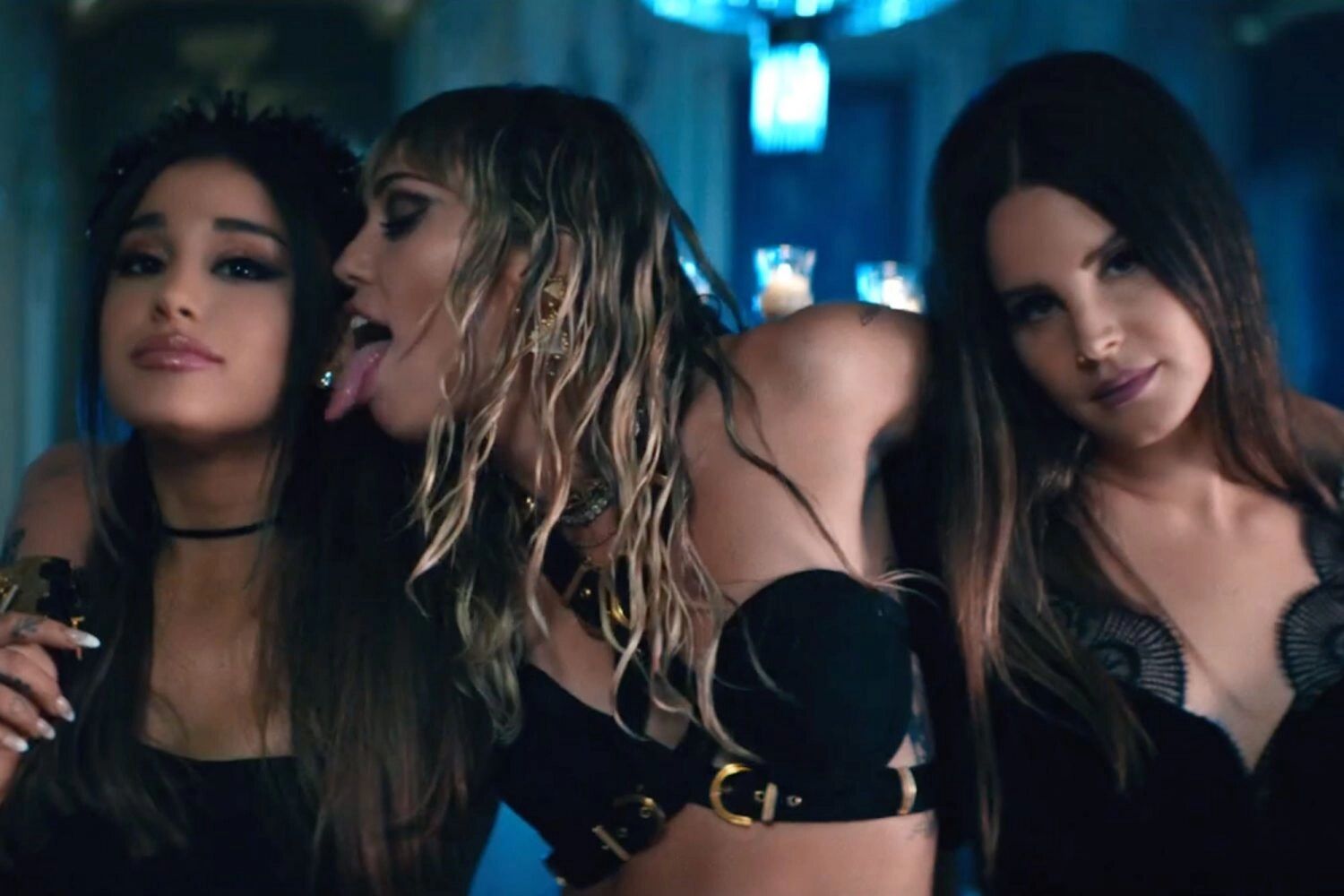Once upon a time there were three very different little girls who grew up to be three very different women with three things in common: they’re brilliant, they’re beautiful, and they all deserve their flowers for singing “Don’t Call Me Angel”. But four years later, one of these women in particular deserves those flowers even more than the rest…
It’s not often that legends like Miley Cyrus, Ariana Grande, and Lana Del Rey unite together on a song. These kinds of collabs can’t come along too regularly, lest you run the risk of killing baby gays too fragile to handle so much pop genius all at once.
But looking back, “Don’t Call Me Angel” isn’t celebrated in the same way that “Bang Bang” or “Lady Marmalade” are. And frankly, that’s homophobic. Why aren’t we still talking about this song in the same hushed, reverential tones reserved for those other gag-worthy collabs?
Fans at the time of release primarily gunned for Lana Del Rey’s verse, claiming she felt out of place, so we’re here to tell you that “You ain’t got her right.” And you ain’t got the song right either if you’re not playing it still every day.
Back before “Don’t Call Me Angel” was released, there was already a lot of hype and pressure going in, even when the label just teased that first tiny snippet in the summer of 2019. It didn’t help that a previous Charlie’s Angels soundtrack broke these people off, Angel style, with an all-time classic from Destiny’s Child. But even if “Don’t Call Me Angel” wasn’t quite up there with “Independent Woman (Part 1)”, that didn’t make it any less iconic.
Critics disagreed, though. Upon the song’s release, reviews for “Don’t Call Me Angel” were mixed to say the least, even though it did perform fairly well, chart-wise. (For what it’s worth, the track also went triple-platinum in my house, although that didn’t stop the pitchforks from coming out online anyway.)
Pitchfork led the charge, of course, with claims that the song has a “distinct flatness” and “cursory verses” that come “at the expense of any chemistry between the singers”. Vulture agreed, claiming that “Angel” “blends styles that sound fine alone but struggle to jell together.”
Most of the blame fell at Lana’s feet. “‘Angels’ strains to figure out what to do with Lana,” said Vulture, while Pitchfork used words like “tepid” and “lackluster” to describe her delivery. Diamondback even went so far as to say Lana “had no reason to be on this song.”
Don’t Call Me Angel” isn’t celebrated in the same way that “Bang Bang” or “Lady Marmalade” are. And frankly, that’s homophobic.
Reading those back today, ultraviolence has never been more on my mind, but not just because Lana can do no wrong. To say “There’s no interplay, joy, or friction” between these Angels, as Pitchfork did, misses the point of the song entirely — and Lana’s verse in particular is key to understanding this.
Miley and Ariana are quite different from each other on paper, but they’re still intrinsically pop with enough shared DNA to make a regular duet work. But Lana? The gangsta Nancy Sinatra is a sad girl through and through, which makes her inclusion here entirely left-field in the best way possible.
Related:
A Gillian Anderson/Lena Headey Western Could Heal All Our Wounds
The gays continue to claim territory in the Wild West.
While the other two strive to keep up to the beat with their snarls and whistles, Lana slinks in with a sensual bridge that forces the track to slow down and get on her terms, shimmering and expanding through her airy delivery.
It’s a sudden, sharp shift that doesn’t quite fit with the rest of the song, just as Lana herself doesn’t quite fit in this big, poppy world. And where she doesn’t fit, others must change to accommodate her.
Look no further than Lana’s influence on mainstream music in general. The “Born To Die” star isn’t poppy in a traditional sense, but when you look at pop music now, it’s divded into two distinct eras: before “Video Games” and after “Video Games.
The way Lana disrupts the status quo and forces everyone else to accommodate her is absolute queen behavior that verges on queer in its defiance. And that’s exactly what she’s doing here again on “Don’t Call Me Angel,” refusing to conform even on a big soundtrack song like this.
Cynics might suggest that Ariana, Miley and the slightly older Lana were just thrown together without any actual thought for how their styles might mesh or clash, but we trust that songwriters like Max Martin and Savan Kotecha knew exactly what they were doing by deliberately forcing this juxtaposition between each artist’s style.
No one bends to the other on this track, Lana least of all, and that’s wherein the genius of “Don’t Call Me Angel” lies.
While Destiny’s Child celebrated the virtues of going it alone without a man, our unlikely trio came together to celebrate their differences instead. They’re not supposed to be a sisterhood. It’s that shared desire to not bond that unites them here, and nowhere is that more obvious than in Lana’s verse.
So say what you want about her verse, but if you think Lana Del Rey had no reason to be on this song, you ain’t got her right.♦
Don't forget to share:
Help make sure LGBTQ+ stories are being told...
We can't rely on mainstream media to tell our stories. That's why we don't lock our articles behind a paywall. Will you support our mission with a contribution today?
Cancel anytime · Proudly LGBTQ+ owned and operated
Read More in Entertainment
The Latest on INTO
Subscribe to get a twice-weekly dose of queer news, updates, and insights from the INTO team.
in Your Inbox














